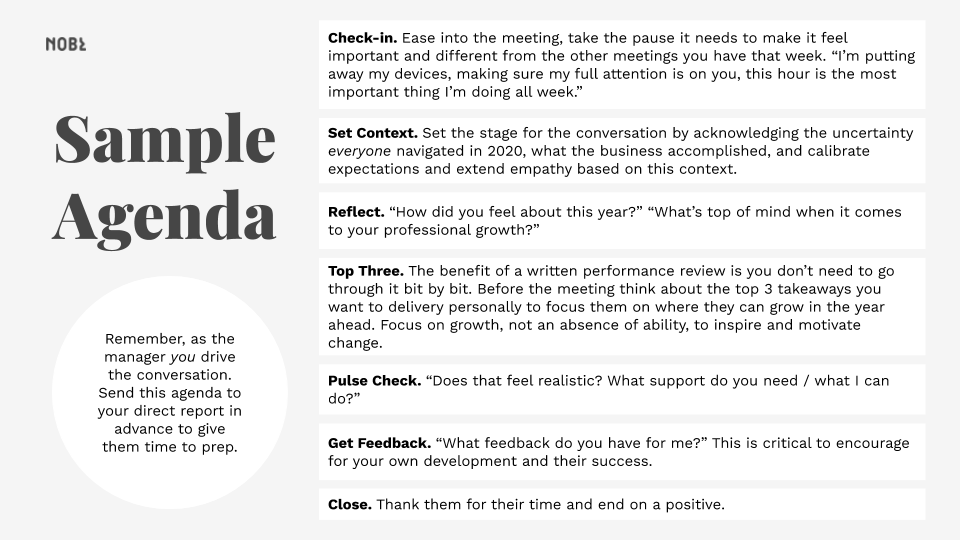It’s annual performance review season—but how can you fairly evaluate performance after a year like 2020?
Over the past few weeks, we’ve spoken with a dozen leaders from a variety of industries, functions, and company sizes about just this question. In many organizations, goals that were set in January 2020 had to be completely thrown out by March as teams scrambled to adjust to working from home and wildly fluctuating consumer demands. Teams experienced unprecedented levels of stress and uncertainty in both their personal and professional lives, and holding them to expectations set a year ago, in a completely different environment, seems unfair and unrealistic. In particular, organizations are struggling with how to approach this year’s performance reviews due to:
- Timing. The timing for the annual and mid-year performance reviews feels tone deaf given that people have been trying to manage a pandemic and civil and political unrest, on top of their professional responsibilities.
- Remote work. Without being in person, it’s challenging to get a complete picture of how a team member is performing. As a result, leaders are depending on others to fill in the gaps.
- Alignment. While company communications have acknowledged the challenges of the pandemic and the need for rest, that message was not translated into how performance is evaluated.
- Career implications. Some organizations did make an effort to reduce the pressure of the evaluation process (e.g., shortening the number of questions or encouraging shorter responses), but this left employees feeling restricted and uncertain about how this would impact their promotions, bonuses, and growth plans.
- Missing the mark. Given the events of 2020 such as BLM protests, employees expected that DEI metrics would be incorporated into their evaluations, and yet, they were once again forgotten.
In response, many leaders have debated skipping performance conversations entirely this year, or even considered overhauling the whole system. It will come as no surprise that we at NOBL recommend a more moderate, iterative approach. Instead of a complete overhaul—adding work in an already overloaded year—try holding more frequent 1:1 conversations focused on how employees are coping with change, and what progress they’re making towards their (revised, simplified) goals. An agenda might look like the following:
- Provide context. Open the conversation by acknowledging the ongoing uncertainty and loss that everyone is navigating. Consider doing a quick “loss inventory:” reviewing the five types of loss and which ones resonate most with them.
- Reflect on accomplishments. Since the focus here is to discuss performance in the context of a pandemic, ask your employee to reflect on the past year: “How did you feel about this year?” or “What comes to mind when thinking about your professional growth?” We’d suggest sharing this prompt in advance so that individuals have time to prepare.
- Simplify growth goals. Ask your employee to share the top three things they’ve learned from 2020, and how they can apply those learnings to this year. Encourage them to think about takeaways that focus on growth and can motivate change.
- Get a reality check. Take a moment to check-in and ask if these goals feel manageable given our current reality. How much control does your employee truly have over these goals? Are they focused more on inputs or outcomes? And what type of support do they need from you in order to achieve these goals?
- Growth goes both ways. 1:1s are also an opportunity for you as a leader to reflect on your performance, as well as modeling psychological safety for your team, so ask your employees if they have any feedback for you.
- End with gratitude: Be sure to close intentionally by thanking them for their energy and effort over the past year. Ask them what they are taking away from the conversation, and align on how often you both want to hold these conversations.
We’ve put together a cheat sheet you can use at your next performance evaluation:









The Evolutionary Edge
Every Link Ever from Our Newsletter
Why Self-Organizing is So Hard
Welcome to the Era of the Empowered Employee
The Power of “What If?” and “Why Not?”
An Adaptive Approach to the Strategic Planning Process
Why Culture/Market Fit Is More Important than Product/Market Fit
Group Decision Making Model: How to Make Better Decisions as a Team